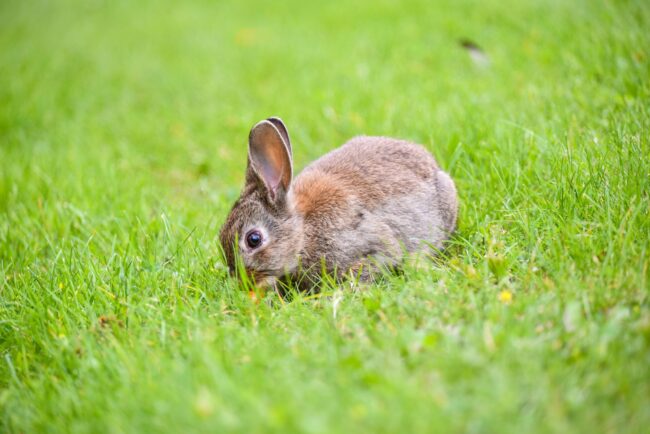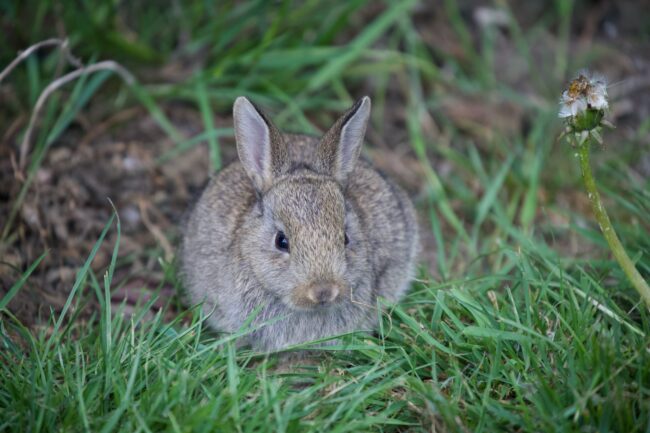Table of Contents
Are you a rabbit watcher? Great! It’s an interesting hobby, for sure. But even beginners know that when a wild rabbit stays in one place, it surely cannot be for no reason at all. These animals need to stay on the move and for good reason – a lot of predators hunt them! So, staying frozen on the spot seems counterintuitive.
So, what is the reason behind this seemingly weird behavior? Don’t worry. We explain the top nine reasons why wild rabbits do this. You might be surprised to learn that there are plenty of valid reasons why they behave in this manner!
Wild Rabbits as a Species
Unlike domesticated rabbits, wild rabbits employ unique behavioral patterns of reproduction and territorial defense. They live in an underground network called warrens. Wild rabbits are deeply programmed to be weary, suspicious, and aware of their surroundings at all times.
Behavioral Patterns
Wild rabbits do not prefer socializing too much. Rabbits appreciate lots of space and actively avoid getting too close to humans. Wild rabbits are constantly on the run looking for food, a good burrow, or to hide from predators.
Rabbits are flighty because they are a major food source for many animals – and they know it. Almost everything they do is geared towards escape, survival, and searching for mates. In this way, they are a lot busier and less likely to stay in one spot than domesticated rabbits. So, why do you sometimes see one of these wild guys do exactly that? Let’s find out!
The Top 9 Reasons
1. Security Reasons
Now rabbits can’t afford a security service, and there isn’t any doubt about the fact that the entire world of predators seems to be after them. What is the smartest way for a bunny to ensure safety?
Full scanning of the surroundings to identify any potential hidden predators waiting to pursue a cold blood murder. However, rabbits are smart and ensure that a burrow is available nearby – just in case.
2. Observatory
A lot of times, there is no choice for a rabbit but to stop and observe their surroundings when they sense that something is wrong. Then, they’ll stay frozen either to hide or to assess everything around them in order to avoid becoming a predator’s next meal. Indeed, being aware of potential threats around them can help wild rabbits to escape the enemy easily in dangerous situations.
3. Preparing to Bolt
Most people are familiar with the concept of potential and kinetic energy. However, rabbits are smart enough to instinctively use this phenomenon for survival. Whenever a predator is nearby, rabbits try to surge up all their potential energy to use as a burst of energy to help them to escape.
Saving up energy gives them a greater push in the hind legs, giving them a powerful speed almost instantly. This ability gives them a fair chance to escape and live another day.
4. Improved Concentration
A rabbit is constantly on the move, and running speedily around the bush is not the best way to spot food! Sometimes, when rabbits stop and look around, it has nothing to do with predators. They are merely scanning, with more concentration, for food or smelling the air to help them locate something yummy. This can take a while, which is why some foraging rabbits will stay in one place for quite some time.
5. They Need to Rest
When most people see a stationary rabbit, they often correctly guess that the bunny needs a rest. Since rabbits are constantly on the move, they can sometimes spend their physical energy quite quickly. When they feel safe, they will sit idly in one place to regain their strength.
Rabbits prefer to do this near their burrows, though. In case of an emergency, they can quickly pop into their home! Although they might look inattentive, wild rabbits are always listening and watching for anything that might be a threat – and they’ll respond immediately.
6. Super Sensitive Senses
Rabbits are extremely sensitive to sound, touch, and smells. When a predator makes a sound, they make it a point to listen and find out where it came from. Very often, they might freeze to focus on the sound and sometimes this works very well – they spot the predator first. Interestingly, a rabbit can hear sounds in the range of 360 hertz to 42000 hertz!
7. Home alone
Mother rabbits are very protective of their offspring. A constant watch is required to detect any possible attack from a predator. Mother rabbits will increase their vigilance while they have young, and often keep watch by sitting around the burrow for hours on end.
8. Nesting and Eating
Very often, rabbits that are stationary near their burrows are just taking some time off. When they feel safe, a wild rabbit might relax a little and just hang around, munching on some foliage or sleeping inside its burrow.
9. Grooming
You cannot make yourself pretty on the run! Like most other mammals, rabbits also like to groom themselves. During a moment when they are certain that there is no danger, rabbits will often sit in one place and groom their coat, ears, and face.
Final Words
On the occasion that you manage to spot them, wild rabbits are fun to watch. Their elusiveness towards humans is a hardwired instinct to stay off the menu and these interesting creatures are masters of survival. We hope that this article encourages you to learn more about the fascinating and surprisingly complex world of bunny body language!


